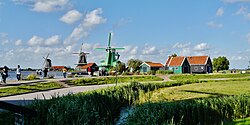Zaanse Schans (Dutch pronunciation: [ˈzaːnsə ˈsxɑns]) is a neighbourhood of Zaandam, near Zaandijk, Netherlands. It is best known for its collection of historic windmills and wooden houses that were relocated here from the wider region north of Amsterdam for preservation. From 1961 to 1974, old buildings from all over the region known as the Zaanstreek were relocated using lowboy trailers to Zaanse Schans.[1] Two of the windmills in Zaanse Schans are preserved on their original site where they were first constructed, and therefore do not constitute part of the relocated structures. The Zaans Museum, established in 1994, near the first Zaanse Schans windmill, is located south of the neighbourhood. This architectural reserve for Zaanse timber construction is a protected village scene because of its architectural-historical and landscape value. It developed into an international tourist destination with several million visitors every year: in 2016, there were 1.8 million, in 2017 – 2.2 million.[2]
Zaanse Schans | |
|---|---|
 Windmills at Zaanse Schans | |
| Coordinates: 52°28′26″N 4°48′59″E / 52.47389°N 4.81639°E | |
| Country | Netherlands |
| Province | |
| Municipality | Zaanstad |
| Time zone | UTC+1 (CET) |
| Website | http://www.zaanseschans.com/ |
Etymology and history
editZaanse Schans derived its name from the river Zaan and its original function as sconce (schans in Dutch) against the Spanish troops during the Eighty Years' War of Dutch independence.
Attractions
editZaanse Schans is a popular tourist attraction and an anchor point of the European Route of Industrial Heritage (ERIH). The neighbourhood attracted approximately 1.6 million visitors in 2014. It is served by Zaandijk Zaanse Schans railway station, 18 minutes away from Amsterdam Centraal station.[3]
The Zaanse Schans houses seven museums — the Weavers House, the Cooperage, the Jisper House, Zaan Time Museum, Albert Heijn Museum Shop and the Bakery Museum. The whole neighbourhood is a popular tourist attraction and there is a debate in local politics on how to reduce overcrowding.[4]
List of windmills
editThe windmills were built after 1574.
- De Huisman (The Houseman), a mustardmill
- De Gekroonde Poelenburg (The Crowned Poelenburg), a sawmill
- De Kat (The Cat), a dyemill
- Het Jonge Schaap (The Young Sheep), a sawmill
- De Os (The Ox), an oilmill
- De Zoeker (The Seeker), an oilmill
- Het Klaverblad (The Cloverleaf), a sawmill
- De Bonte Hen (The Spotted Hen), an oilmill
See also
editReferences
edit- ^ "History: Zaanse Schans brings Dutch history to life". Zaanse Schans. Retrieved 23 February 2015.
- ^ "Recordaantal bezoekers voor Zaanse Schans". NU (in Dutch). 2018-01-05. Retrieved 2022-06-20.
- ^ "Recordaantal bezoekers op de Zaanse Schans in 2014" [Record number of visitors to the Zaanse Schans in 2014] (PDF) (in Dutch). Archived from the original (PDF) on 2015-07-17. Retrieved 2015-07-17.
- ^ Sanou, Hanneke (22 January 2019). "Too many tourists spoil the fun: locals call for action on overcrowding". DutchNews. Retrieved 16 April 2024.
